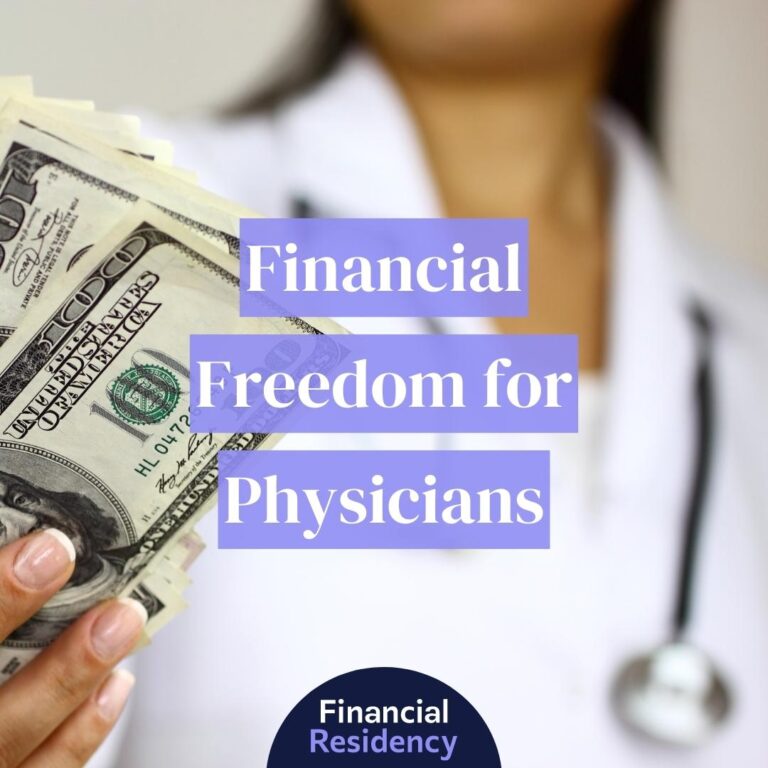This is why a doctor should take care of their finances.
As a doctor, it’s natural for you to take care of your patients. It’s something you’ve learned how to do over the past decade, and graduating from residency seems like the final step – the one you’ve been waiting for.
Of course, while you’re taking great care of your patients and working hard as a new physician, don’t forget to extend that same amazing care to yourself – and your finances.
Graduating from residency and starting your career is a busy time, but it’s also a time when you’ll experience a large income jump, when your student loans will be due, and when you’ll start to feel the pressure of lifestyle inflation.
So, although you’re busy taking care of others, don’t forget to take care of you too. Below are some ways to do just that.
1. Establish a Budget
While the B word seems boring and somewhat daunting for many physicians, it doesn’t have to be. There are amazing online tools that can help you analyze your spending and get your finances in order. Some of the most common ones include Empower and YNAB (You Need A Budget).
This is also a great way to accelerate your debt payoff (or investment savings if you are going for Public Service Loan Forgiveness). By looking at your spending, you can see how much of your money goes to categories you can minimize, like eating out or pricey subscriptions. If you can analyze your spending to find ways to save, you can then funnel those savings into paying down your debt.
Remember, the 3-5 years after residency are critical. This is the time to work hard both at the hospital and with your personal finances too. If you create good habits now to watch your spending, you’ll be ready to harness your income and increase your wealth over time.
2. Avoid Lifestyle Inflation
Being aware of your spending can help you avoid lifestyle inflation too. A good rule of thumb is to ensure your spending doesn’t increase by more than 20% in the first 3-5 years after residency.
It is extremely common for new physicians to get caught up in the lifestyle creep, so don’t let it happen to you!
As someone who is married to a physician, I know it’s hard living off of a resident salary; however, it’s important to keep some perspective.
For example, let’s say you are now making 200k instead of your previous income of 55k. After taxes, your take-home pay has risen from 41k to 130k and you suddenly have money to spend!
Here’s the key – don’t go nuts.
If you increase your previous spending (assuming you spent every cent you earned in residency) by 20%, that would give you an extra $700/month as an attending. That extra cash will allow you to ditch the ramen and enjoy a guilt-free Starbucks latte, in addition to other splurges you’ve long avoided.
Meanwhile, the bulk of the extra income that you aren’t spending (80k after taxes in this example) will go towards paying down debt, saving for a home, maxing out 403b and IRA’s, etc.
This extra income will also allow you to catch up on the past decade of little to no investment and retirement savings. If you have accumulated ANY consumer debt (credit card debt or other high-interest debt that is not student debt), prioritize to pay this down as soon as possible. Do this for 3-5 years and you will be well on your way to financial freedom.
3. Do Some Goal Planning
Doctors are about as goal-oriented as it gets, but that doesn’t always apply when it comes to financial goals. So, spend some time thinking about your goals and major expenses coming up in the next 1, 3 and 5 years, and write them down.
They don’t need to be set in stone; think of these as moving targets. Try to set ambitious goals and strive to hit big milestones (like paying off your debt in 5 years – or 3 years!)
Most goals have a financial component, even when it comes to planning vacations or big purchases. So, come up with numbers for each goal you have and decide how you would like to pay for them.
For example, you might have the goal of traveling two times a year domestically. Write down this goal, then include the average cost of a trip ($2,000), and how you’re going to pay for it. For example, you can write down that you’re going to pay for the trip with a credit card and then immediately paying it off at the end of the month. Writing your goals down with this level of detail not only keeps you organized but it makes you more likely to achieve them.
4. Start Investing ASAP
Start investing ASAP in your employer’s sponsored plan (401k/403b), especially if they have a match. Open a traditional IRA and contribute the maximum each year. The current limit for 2017 is $5,500/year which comes out to $458/month. You can open an IRA at any traditional brokerage house (we custody our assets at TD Ameritrade, but Fidelity and Vanguard are fine options as well).
While I can’t give exact investment advice, I invest in passively managed exchange traded funds, also known as index funds. Don’t fall prey to active management and advisors trying to beat the market. There is enough research and data out there that proves how active management can’t beat passive investing in the long term. (I’m talking Nobel Prize winning research, not some random white paper on the subject either. Be smart, don’t be fooled.)
5. Have a Plan for Your Loans
If you plan on trying to get forgiveness via the PSLF program, make sure you keep up with your public student loan forgiveness employment certification form. Do not fall behind on submitting this documentation. Student debt will most likely be your #1 or #2 biggest expense post residency (second only to a mortgage/rent).
So, make sure that you verify your income, run projections on how much your payment will go up, and budget accordingly. If you aren’t going for PSLF, closely evaluate your options and analyze if refinancing your student debt makes sense. Make sure to research the pros and cons of refinancing federal student debt and read all the fine print.
Paying off your debt might seem like an incredibly overwhelming and confusing process, but it doesn’t have to be. I’m always happy to help walk you through the student loan repayment process and discuss which route is best for you.
*
Ultimately, now that you’ve graduated from residency, you have so much potential when it comes not only to your career, but your finances too. Take the time to make a plan for your finances, track your spending, and set strong goals, and you’ll be surprised at just how much wealth you can build in a short amount of time.




